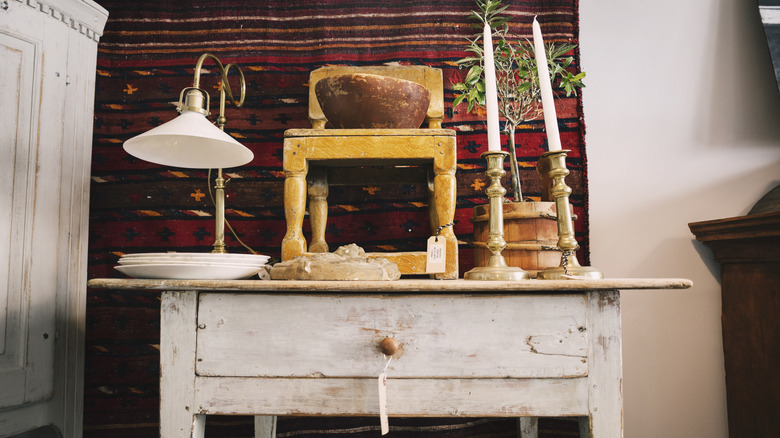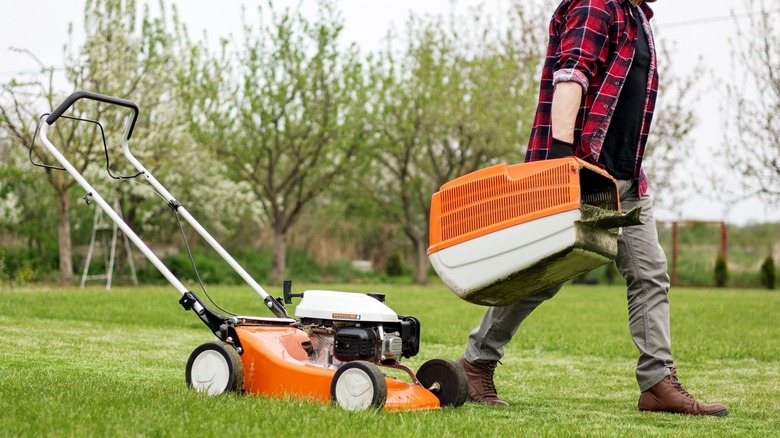10 Common Household Items You Should Sell Before Retiring
A transition in life is often accompanied by more far reaching change. As you prepare to leave the nest and go off on your own adventure, suddenly you'll be tasked with managing new monthly bills and an increase in household management tasks. Cooking and cleaning for yourself is no longer an option at this shift. Similar changes occur throughout your adult life, but one of the largest inflection points of any lifestyle comes when a worker exits their employer's facilities for the final time. The last paycheck you receive from your workplace brings about more than just a finality in this phase of financing your life. It's a complete overhaul of your time, budgeting tasks, and much more.
Retirees can expect to enjoy a robust lifestyle with plenty to fill their days if they've spent their working years preparing for the future. Even a modest pace of savings can translate into a solid nest egg for those who started their investment journey early. Whether your investment accounts are prepared to sustain you well or not, many soon-to-be retirees target a range of household items to get rid of as they prepare for their curtain call. Selling some of these goods can bring back a major influx of cash that helps make the change less jarring. But there are actually a number of additional features that play into this decision — indeed it's not just a pure financial benefit you'll enjoy by shedding one or more of these common things found around the house.
Luxury and family-oriented cars (including second or third vehicles)
Many people have more than one car at home. Plenty of commuters who have been making the daily drive for years will have invested in upgraded vehicles, as well. If you drive a large SUV or a luxury automobile that sits low to the ground, you are riding around in a car that may no longer suit your lifestyle needs. Retirees often base their lives around a brand new set of priorities. If you're an avid golfer, for instance, you'll need enough trunk space carry your clubs to the course, but most vehicles can realistically accommodate this requirement. What you frequently won't need in a vehicle is family-sized mobility. Retirees don't tend to cart around family members like they once did and so large SUVs and vans might ultimately constitute a bulky vehicle that just isn't right for your new demands.
The same could be said for cars you have to sit down into. Not every retired person will have the same needs, but as you age you'll frequently find it harder to get into this kind of car without a struggle. Shifting your car buying focus toward something that's comfortable and supportive of your new mobility needs can be a great way to pivot out of are potentially expensive ride. For those with multiple cars they no longer need, trading in two of them for a single car purchase can be a powerful means of accomplishing this.
Your home (potentially)
Plenty of retirees will have a distinct moving plan in mind to coincide with their exit from the workforce. Lots of people seek to downsize their home once they stop working. You might be interested in a move that allows you to buy a smaller property in the same area you spent your working life. Alternatively, a change of scenery that sees you swap suburban living for an apartment in your favorite city can be equally valuable (perhaps in a state that won't tax your Social Security benefits, too). Either way, the opportunity to sell your home gives you a unique advantage. As a retiree, you won't need to live in any particular place to support your daily trip into the office. You may still want to live near friends and family, but choice becomes far more abundant once work pressures are taken off your plate.
There are lots of American cities that retirees might consider moving to, and there are plenty of financial incentives to enact even a small scale move. If you're at the tail end of your mortgage, selling your home and buying something outright can eliminate this monthly expense. Your home has likely increased in value since the time you bought it, so you will almost certainly have a good volume of buying power consider your range of options on the market. No matter how you slice it, selling your home is often a great way to supercharge your retirement finances.
Furniture you no longer need
People in the process of packing up their home to support and move will often come across countless belongings that they no longer need. One big ticket item that tops this list is furniture. Those packing up for a move won't be incentivized to bring along their bulky furniture. Not only does this significantly increase the cost of moving, but it can also be a real headache when it comes time to refurnish a new property. Many of the furnishings in your home have been collected over a long period of time to fit precisely in spaces within that unique living area. A new property has its own design quirks and oddities. This means that you may ultimately find yourself shoving square pegs in round holes. Moving gives you an opportunity to start over with your style and other elements of your living space, and selling old furniture is a great way to knock a bit off the top when it comes to buying new wardrobes, desks, and more.
Those who aren't moving can also gain value in getting rid of some of their furniture. Old furniture is often far more financially valuable than you might think. Modern pieces are either wildly expensive or constructed with cheap particle board and other materials that aren't built to last. This makes high quality antiques a uniquely positioned commodity. Plenty of buyers will line up for the chance to purchase a well-constructed coffee table or dresser with character and history. If you don't need it any longer, selling these kinds of goods can be a real financial windfall.
Collectibles you've been keeping safe for years
Baseball cards, a vintage record collection, and many other collectibles can ultimately be an incredible source of new wealth. These kinds of collections may not have started in your care as something intending to become a financial resource. Many people start collecting sports cards or comic books because they love the entertainment value these kinds of products bring. But collectors quickly find out that the things they've been adding to their shelves, drawers, or boxes actually have significant financial value. All kinds of goods can become part of a high dollar value collection. If you've been holding on to certain assets for many years and building a reservoir of collectibles, as you shift into retirement you are faced with a great opportunity to reduce your collection and cash out. You might consider selling the bulk of your library in order to refocus assets on only the most expensive examples. This can be a great strategy for doubling down on the investment aspect of the collection. Alternatively, selling some of your higher priced pieces can liquidate capital that helps fund your retirement right away.
Another thing to consider comes in the form of a move. Many opportunities to sell things you've been holding on to for many years come about as a result of a desire to move to a new home. It can be a real hassle to box up and physically transport delicate and important collectible goods. Instead, selling some or all of your collection allows you to cash in while minimizing the worry over moving your goods to a new location and figuring out how to continue storing them safely.
Consider shifting your investment portfolio by selling volatile or growth-focused stocks
The stock market is something that supports most retirees' aspirations. As you continue your journey through the working life and head on toward greener pastures and retirement, you'll almost certainly be investing in a broad spectrum of stock market assets. The stock market is probably the most accessible investment vehicle available to savers. High-yield savings accounts can be opened with a few clicks in many cases, but so too can investment brokerage accounts. Moreover, your investment account will deliver greater potential yield than the safer and notably less exciting waters of a savings account or CD option.
But, as you continue to age and get closer to your retirement date, you'll want to gradually shift your holdings out of highly volatile options focused on growth. Young investors naturally have a much higher appetite for risk because they have far more time on their side to make up for any midstream losses that may accumulate. As you get older, you'll want to protect a growing portion of your nest egg from volatility so that your retirement plans aren't dramatically washed away in a sudden market downturn. As you approach retirement, selling off some or all of your growth focused assets in order to roll the capital into safer harbors like an index fund or a stable company asset is likely a good idea.
Exercise equipment
Many people bring exercise gear into their homes. This is a particularly prevalent choice for those who are working professionals and spend much of their time rushing from one commitment to the next. People in the workforce frequently find themselves on the back foot when it comes to balancing all of the things they need to get done with activities they want to include in their lifestyle. This only becomes more prominent for those with children or people with complicated daily routines like an hour-plus commute on either end of the work day.
Exercise equipment at home allows people who are busy throughout the day to get on the treadmill for a quick jog or engage their rowing machine to get in some quick exercise whenever they have time. But retirees no longer need to fit these desires around large scale commitments in most cases. Moreover, seniors have the ability to work in discounts at many local gyms. This means that selling your exercise equipment can give you a lump sum of cash and clear out a room or the garage to support other activities, all while getting a better price for a membership that you can use whenever the mood strikes.
Old books
Books are a common sight in so many homes. Plenty of people buy books they're interested in reading or need for school or work and then set them on a shelf and forget about them. As you go through life, you'll continue to collect more and more titles that rest quietly on the shelves around your home. As you gear up for a move, you'll often reconsider keeping these books. Ultimately, many people will just box them up and bring them along for the ride. As you prepare to transition into retirement, really thinking about whether this is the best option for your home and organizational needs is a good idea.
Selling your book collection allows you to get rid of something incredibly bulky that takes up a lot of room and is incredibly hard to move as a group. If you're downsizing, selling your books is a great way to take a major load off of the moving process. Books often maintain fairly substantial financial value, too. Even just a few selected first editions or rare printings can really drive up the value of your collection. This is yet another item that can yield a substantial cash infusion while getting rid of a difficult collection of goods to manage.
Power tools and lawn care equipment
If you are downsizing you almost certainly won't need a large collection of tools and equipment. For those moving into city apartments or even swapping out a home with a large surrounding yard for one with a bit less maintenance required, shedding some of this gear can help tremendously in the packing and moving process. It will also bring a few extra dollars back into the picture. The money you receive from this kind of sale can be expansive if you've spent years collecting high quality equipment to tackle home repairs, lawn care, and other tasks. Indeed, many tool users ultimately amass a mountain of equipment.
Selling your gear ahead of a move is something of a no-brainer. However, even if you aren't planning on downsizing or relocating more generally you might still consider selling some of your old tools. Many people have gotten into home improvement projects, woodworking hobbies, and crafting circles more broadly. More time spent at home in recent years combined with the definitive mental health benefits that come from working with your hands and building things has led many to collect tools in pursuit of these kinds of hobbies. As you matriculate into retirement, selling your old tools in order to leverage that cash into buying power for new equipment that can continue your sources of enjoyment might ultimately be a valuable upgrade opportunity.
Your life insurance policy
Life insurance is typically a great idea for those who are working and require coverage to support loved ones if they suddenly experience an accident or illness. Early on in your career, a life insurance policy can guarantee financial support for your family if the worst were to happen. Without this additional layer of protection, a tragedy can quickly spiral into a much wider catastrophe that involves numerous points of pressure. It's a grizzly thought, but careful planners looking ahead to the future can't afford to overlook the potential for these kinds of calamities. In your younger years, life insurance gives you a crucial peace of mind that allows you and your family to know that one major tragedy won't continue to balloon into the financial realm.
As you age, your life insurance policy becomes less important on the whole. Generally speaking, saving as a means to provide an estate for your loved ones or bolster retirement funding is a better use of your money once this need for overt financial protection begins to subside. For most, new policies cost too much to be effective, and maintaining an existing policy may not provide the value you're seeking either. Instead, selling your life insurance policy can give you a lump sum payout that allows you to invest in new assets or provide a direct cash infusion to your lifestyle needs in the here and now.
Rental properties and other complex investments
A rental property can be an excellent way to drive supplementary, monthly income. For those without the time required to manage a property or the cash necessary for a down payment, REITs can provide a robust alternative. These funds are valuable to investors for more than just the access they provide, however. The real estate market is a decidedly complicated space. Older Americans today make up the bulk of total homeownership assets, and it's anticipated that over the next 20 years a major shift will occur as Baby Boomers continue to age, selling their properties or leaving them to loved ones.
Experts are divided on what this might ultimately mean for the marketplace, but all signs point to institutional investors and Gen X buyers reaping the greatest level of benefits from this change. Whether you're an older American with a rental property today or someone who may be buying one in the coming decades, getting out of the rental game as you prepare for retirement might be your best bet, even as it runs contrary to what is frequently thought of as a sound wealth building strategy. The problem is that real estate requires effort. Interacting with a renter introduces a unique element of personal risk that isn't present in other asset classes. This is where REITs can be a major upgrade for some. These funds bring these same kind of real estate investment into your portfolio but they spread the risk out in the same way that an index fund might. The result is a shift that provides much of the same benefits without the enhanced risk.










